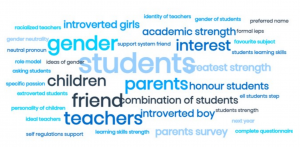Anti-oppressive student placement cards
With the focus on anti-oppressive pedagogy, my board of education is advocating for schools and teachers to consider their past practices in supporting students. This, of course, includes writing report card comments and student placement cards that are inclusive and equitable in nature. I will cover report card comments in a later blog.
In this blog, I’d like to address the past practices of the placement of students into classes
Past Student Placement Cards:
- Gender: Blue cards for boys, Pink cards for girls
- Academic success: High, Medium, Low (circle one)
- Language: High, Medium, Low (circle one)
- Math: High, Medium, Low (circle one)
- Special Education Support: formal/informal IEP (circle one)
- English Language Learners: Steps of ELL for Listening, Speaking, Reading, Writing
- Students to place in same class with:
- Students to not place in class with:
- Attendance issues: Yes/No Reasons for absence:
- Student Behaviour: Big “B” and little “b”
- Parental issues: Big “P” (big parent problem)
In looking closely at these descriptors, it seems obvious that they are obviously oppressive in their approach.
With feedback from teachers about student placement cards, themes came from their comments and conversations. These included (some points will naturally overlap):
Focus on student
Gender Neutral
- No colour coded cards
- Preferred gender identification (e.g. she/her, they/them, he/him)
- Gender identity (e.g. male, female, transgendered, gender nonspecific)
- No balancing the number of “boys” and “girls” in classes
Learning Styles/Personalities
- Extrovert, introvert, a little of both
- Academic and Non-academic strengths
- Academic and Non-academic needs
- Consider placing students with “supportive” friends
- Consider students seeing self identity in teacher’s identity (i.e. BIPOC, Racialized)
- Ask students who they would like to have and not have in their class
- Ask students what type of teaching style they prefer
- Consider who they like to collaborate with
- Resources required to support needs (i.e. Behaviour Teaching Assistant, Office Support, Educational Assistant, public health nurse for medical issues)
Student conference/feedback/questionnaire
- Extrovert, introvert, both
- Academic and Non-academic strengths
- Academic and Non-academic needs
- Consider placing students with “supportive” friends
- Consider students seeing self identity in teacher’s identity
- Ask students who they would like to have and not have in their class
- Ask students what type of teaching style they prefer
- Consider who they like to collaborate with
- Greatest strength, greatest need academic and non-academic
- What I want my teacher to know about me …
What sparks student’s interests?
- Favourite subjects, topics, interests, passions
- Hobbies
- Art, Music, Drama
- Sports
- Things they do out of school
Focus on Classroom
Class Composition
- No stacking classrooms with students with IEPs
- Consider number of introverts with extroverts
- Consider placing students with “supportive” friends
- Consider students seeing self identity in teacher’s identity
- Ask students who they would like to have in their classroom
- Ask students what type of teaching style they prefer
- Level of emotional and behaviour support needed (Behaviour Teaching Assistant, Office support)
Learning Environment
- more structured, less structures
- style of teachers
- types of learning tools in class
- more tech savvy with more techy teacher
- Hard of Hearing in quieter class with lower noise level
Focus on Community
- consider 1st language of student
- put students who speak the same language with same language, supportive friends
- build community of same language speakers in school
Parental conference/feedback/questionnaire about child
- ask parents how to support their child next year
- Student is an extrovert, introvert, both
- Academic and Non-academic strengths
- Academic and Non-academic needs
- Consider placing students with “supportive” friends
- Consider students seeing self identity in teacher’s identity
- Ask parent who they would like their child to have and not have in their class
- Ask parents about preferred teaching style for their child
- Greatest strength, greatest need academic and non-academic
- What I want my child’s teacher to know about my child
- Students to help create a parent survey to learn about what is important to the school community, school families, and students
This is not a complete list, nor have I actually developed student placement cards that reflects these themes – there is a draft below. I also have not developed a survey to collect this data – but I will ask my students to do this as part of a math assignment.
The purpose of this collection of themes is to spark discussions and thoughts about developing anti-oppressive student placement processes that will support students and teachers in the business of learning.
This is a start. I’d love to get feedback on developing student placement cards further – please leave a comment below.
Collaboratively Yours,
Deb Weston, PhD
Draft of Student Placement Card/Information
- Identity: Female – Male – Gender Neutral – Trans – Other
- Pronouns: She/Her, He/Him, They/Them, Other
- Personality: Introvert-Extrovert-Both-Other
- Racial Identity: BIPOC, FMNI, Mixed, Other
- Special Education Support: formal/informal IEP (circle one)
- English Language Learners: Steps of ELL for Listening, Speaking, Reading, Writing
- Language(s) spoken at home:
- Favourite Subjects: Language, Media, Math, Science, Social Studies (History/Geography), Phys Ed/Gym, Music, Art, Drama, Recess, French
- Least Favourite Subjects: Language, Media, Math, Science, Social Studies (History/Geography), Phys Ed/Gym, Music, Art, Drama, Recess, French
- Supportive Student Friends:
- Students who need a break (from each other):
- Medical Needs/Fears:
- Favourite Things To Do (away from school):
Any suggestions? Please make a comment below!


One thought on “Anti-oppressive student placement cards”